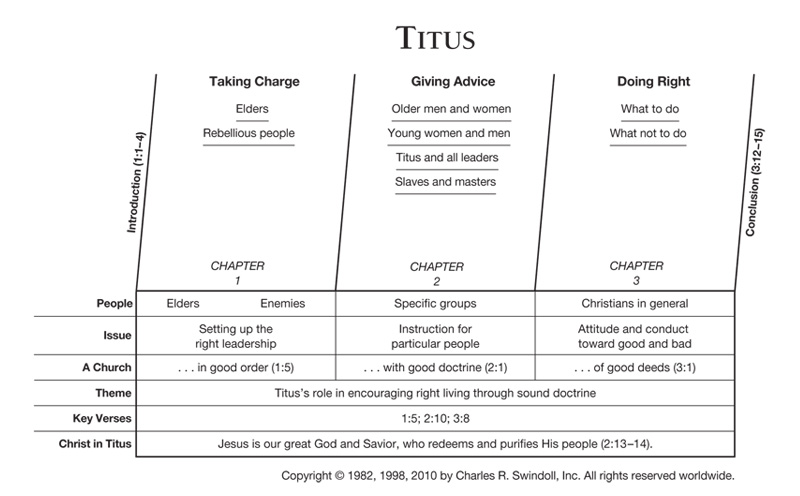
WHO WROTE TITUS?
Paul identified himself as the author of the letter to Titus, calling himself a “bond-servant of God and an apostle of Jesus Christ” (Titus 1:1). The origin of Paul's relationship with Titus is shrouded in mystery, though we can gather that he may have been converted under the ministry of Paul, who called Titus “my true child in a common faith” (1:4). Titus accompanied Paul on his third missionary journey, during which the apostle sent him to Corinth at least once (2 Corinthians 2:12-13; 7:5-7, 13-15; 8:6, 16-24). Paul clearly held Titus in a position of great respect as a friend and fellow worker for the gospel, praising Titus for his affection, his earnestness, and his bringing comfort to others.
WHERE ARE WE?
Paul wrote his letter to Titus from Nicopolis in AD 63, after the apostle's release from his first Roman imprisonment. Upon leaving Timothy in Ephesus to minister there, Paul accompanied Titus to the island of Crete, where he intended Titus to lead and organize the island's churches in their early years of existence. While the gospel had no doubt spread to Crete soon after Peter's sermon at Pentecost (Acts 2:11), Paul and Titus likely did a good deal of evangelism on the island in the weeks before Paul commissioned Titus to a leadership position there.
WHY IS TITUS SO IMPORTANT?
Three summaries of the incarnation dot the pages of Titus, providing a framework within which the Christian can view the work of God in the world and in individual lives (Titus 1:1-4; 2:11-14; 3:4-7). All three passages involve the manifestation, or appearance, of God in Christ, rooting the Christian faith in the incarnation of Jesus Christ. Only when God the Son took on human flesh in the person of Jesus was the believer's faith in God made sure. In other words, since God poured out His grace on all humanity, He cleanses His people from their sin and purifies believers for Himself. This grace of God instructs us to live upright and godly lives in this present age (2:11-3:8).
WHAT'S THE BIG IDEA IN TITUS?
The doctrine of the incarnation in the letter to Titus grounds its message of producing right living through the careful attention to theological truth. The churches on Crete were just as susceptible to false teachers as any other church, so Paul directed Titus to establish a group of faithful elders to oversee the doctrinal purity and good conduct of the believers on Crete. Paul exhorted Titus to “speak the things which are fitting for sound doctrine” (Titus 2:1), a clear direction that this should be the young pastor's primary role.
However, Paul also understood that when a body of believers embraces sound doctrine, the result is changed and purified lives that produce “good deeds” (mentioned in Titus 2:7, 14; 3:8, 14). God's grace is the motivation for all good deeds. Paul gave instructions to Titus about the roles of specific groups of people—older men, older women, young women, young men, and slaves—as well as general instructions to all believers about their conduct. Right living was essential because Christ “gave Himself for us to redeem us from every lawless deed,” saving us “by the washing of regeneration and renewing by the Holy Spirit” (Titus 2:14; 3:5).
HOW DO I APPLY THIS?
How seriously do you consider your beliefs about God in the overall scheme of your life? The book of Titus reminds us that our beliefs about God impact every decision we make. Sometimes it is difficult for believers today to see the point of getting all worked up about the person and nature of Christ or the doctrine of the Trinity. However, Paul made clear that a church that teaches and preaches sound doctrine will see results in the lives of its people. Not only will people be saved from their sins, but God's grace will also motivate them to live out that saving faith with renewed and purified lives.
Many churches today focus more on the form of their worship—music styles, lighting, and building designs—than they do on the content of the faith they mean to proclaim. And while the form of a church's worship is vital to reaching its community for Christ, without a firm base of sound doctrine, the church will lay its foundation in shifting and sinking sand. Make doctrine a priority in your own life, as well as encouraging it in your churches. Nothing is more significant than a solid foundation in Christ. Nothing is more motivational than grace to live a life of good deeds.

